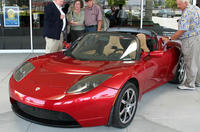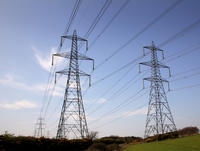-
Belief that others can change could bring peace
Psychologists find that members of groups engaged in conflict are more willing to compromise if they believe people are capable of changing; when researchers presented Israelis and Palestinians with evidence that groups of people are capable of change, the information increased the subjects’ willingness to compromise on key political issues
-
-
E-textiles now come with memory-storing fiber
E-textiles could help soldiers, first responders — but also the sick and infirm; the integration of electronics into textiles is a growing field of research that may soon enable smart fabrics and wearable electronics
-
-
Georgia shows app that prepares state residents, guides them to safety
New Ready Georgia mobile app uses geo-location to deliver alerts, create emergency plans, and show shelter locations; from up-to-the-minute weather and hazard alerts based on a user’
‘s location, to customizable emergency preparedness checklists, the app combines a set of features not previously available in one mobile application -
-
Shells tracked by radar
With the high costs of live fire training, the Pentagon wanted a shell-scoring system, and commissioned Cambridge Consultants to develop one; after fourteen months of development, the company unveiled its holographic radar scoring system, the Land and Surface Target Scorer (LSTS)
-
-
Anti-magnet: to protect ships' hulls from mines
Researchers have created a new type of magnetic cloak which shields objects from magnetic fields — at the same time that it prevents any internal magnetic fields from leaking out; this “antimagnet” could be used to protect a ship’s hulls from mines that detonate when a magnetic field is detected
-
-
The Certified Protection Officer (CPO) 8th Edition launched
The updated version of a training course for Certified Protection Officers is now available online; the course and exam provide candidates with the IFPO certification; the course offers training in security technology, laws, trends, and techniques
-
-
Global water market could hit $800 billion by 2035
Analysts are predicting that the global market for water could grow dramatically over the next two decades, with some projecting a $1 trillion market in 2020; “Water is the fastest growing market at the moment, with a size of $500 billion globally,” said Harri Kerminen, the president and CEO of Finnish chemical firm Kemira
-
-
Speeding skyscraper construction -- and making them stronger
Researchers are working on a new technique that could speed construction of skyscrapers while also providing enough stiffness and strength to withstand earthquakes and forces from high winds
-
-
Proton-based transistor could let machines communicate with humans
Devices humans use, from light bulbs to iPods, send information using electrons; human bodies and all other living things, on the other hand, send signals and perform work using ions or protons; researchers build a novel transistor that uses protons, creating a key piece for devices that can communicate directly with living things
-
-
Future electric vehicle to run unlimited distances

Electrically powered vehicles (EV) are promising environmentally friendly alternatives for combustion engine-based automobiles; batteries used in present-day EV, however, limit the continuous running distance from one charge; researchers propose a potentially revolutionary solution for powering EVs capable of running unlimited distances
-
-
New vest offers GPS tacking and other information
Canadian company Laipac Technology is showing its S911 GPS Vest which the company describes as “a high coverage assault protection designed for military, tactical law enforcement and VIP personnel that demand the highest protection.”
-
-
Tsunami-predicting software to help protect coastal communities

New software has been developed to help protect vulnerable coastal communities from the destruction of a tsunami; the mathematical model has created significant interest in the wake of the 2011 earthquake and tsunami in Japan six months ago
-
-
Laser device detects IEDs

Researchers have developed a laser that could detect roadside bombs — the deadliest enemy weapon U.S. and coalition soldiers encountered in Iraq and Afghanistan; the laser, which has comparable output to a simple presentation pointer, potentially has the sensitivity and selectivity to canvas large areas and detect improvised explosive devices
-
-
Environmentalists worry border environment protection
Environmentalists have taken aim at an amendment to the Senate appropriations bill for DHS that would allow border enforcement agencies ultimate authority within 100-miles of the U.S. border
-
-
Designing a new grid pylon

There are more than 88,000 pylons in the United Kingdom; they stand some 50-meters high, weigh around twenty tons, and carry up to 400,000 volts of electricity over thousands of kilometers of some of the most exposed, weather-beaten parts of Britain; the familiar steel lattice tower has barely changed since the 1920s; National Grid says it is time for a change
-
More headlines
The long view
Autonomous Vehicle Technology Vulnerable to Road Object Spoofing and Vanishing Attacks
Researchers have demonstrated the potentially hazardous vulnerabilities associated with the technology called LiDAR, or Light Detection and Ranging, many autonomous vehicles use to navigate streets, roads and highways. The researchers have shown how to use lasers to fool LiDAR into “seeing” objects that are not present and missing those that are – deficiencies that can cause unwarranted and unsafe braking or collisions.
Tantalizing Method to Study Cyberdeterrence
Tantalus is unlike most war games because it is experimental instead of experiential — the immersive game differs by overlapping scientific rigor and quantitative assessment methods with the experimental sciences, and experimental war gaming provides insightful data for real-world cyberattacks.
Prototype Self-Service Screening System Unveiled
TSA and DHS S&T unveiled a prototype checkpoint technology, the self-service screening system, at Harry Reid International Airport (LAS) in Las Vegas, NV. The aim is to provide a near self-sufficient passenger screening process while enabling passengers to directly receive on-person alarm information and allow for the passenger self-resolution of those alarms.
Falling Space Debris: How High Is the Risk I'll Get Hit?
An International Space Station battery fell back to Earth and, luckily, splashed down harmlessly in the Atlantic. Should we have worried? Space debris reenters our atmosphere every week.
Testing Cutting-Edge Counter-Drone Technology
Drones have many positive applications, bad actors can use them for nefarious purposes. Two recent field demonstrations brought government, academia, and industry together to evaluate innovative counter-unmanned aircraft systems.
Strengthening the Grid’s ‘Backbone’ with Hydropower
Argonne-led studies investigate how hydropower could help add more clean energy to the grid, how it generates value as grids add more renewable energy, and how liner technology can improve hydropower efficiency.
